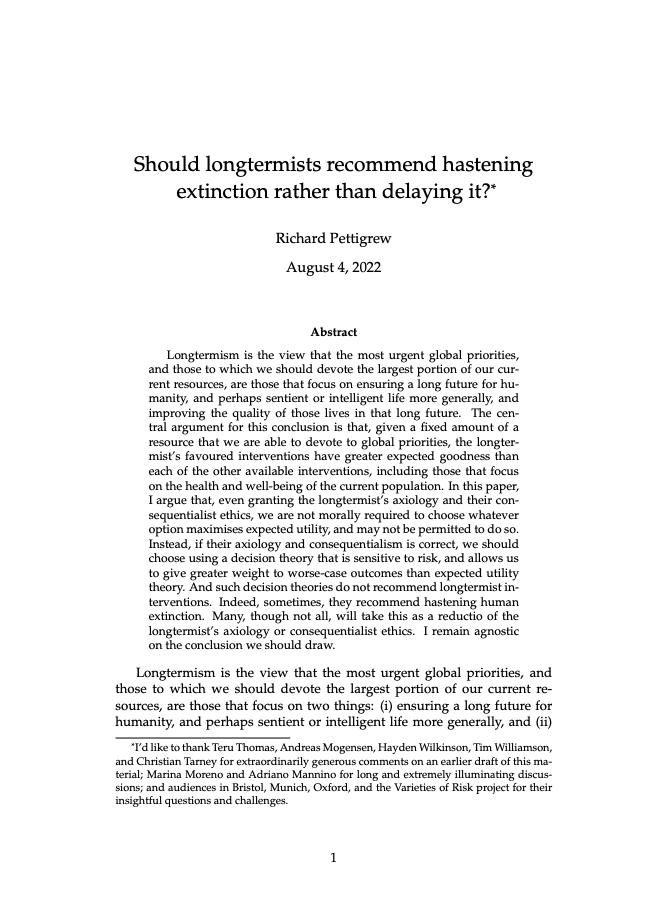Should longtermists recommend hastening extinction rather than delaying it?
Richard Pettigrew (University of Bristol)
GPI Working Paper No. 2-2022, forthcoming at The Monist
Longtermism is the view that the most urgent global priorities, and those to which we should devote the largest portion of our current resources, are those that focus on ensuring a long future for humanity, and perhaps sentient or intelligent life more generally, and improving the quality of those lives in that long future. The central argument for this conclusion is that, given a fixed amount of a resource that we are able to devote to global priorities, the longtermist’s favoured interventions have greater expected goodness than each of the other available interventions, including those that focus on the health and well-being of the current population. In this paper, I argue that, even granting the longtermist’s axiology and their consequentialist ethics, we are not morally required to choose whatever option maximises expected utility, and may not be permitted to do so. Instead, if their axiology and consequentialism is correct, we should choose using a decision theory that is sensitive to risk, and allows us to give greater weight to worse-case outcomes than expected utility theory. And such decision theories do not recommend longtermist interventions. Indeed, sometimes, they recommend hastening human extinction. Many, though not all, will take this as a reductio of the longtermist’s axiology or consequentialist ethics. I remain agnostic on the conclusion we should draw.
Other working papers
Is Existential Risk Mitigation Uniquely Cost-Effective? Not in Standard Population Models – Gustav Alexandrie (Global Priorities Institute, University of Oxford) and Maya Eden (Brandeis University)
What socially beneficial causes should philanthropists prioritize if they give equal ethical weight to the welfare of current and future generations? Many have argued that, because human extinction would result in a permanent loss of all future generations, extinction risk mitigation should be the top priority given this impartial stance. Using standard models of population dynamics, we challenge this conclusion. We first introduce a theoretical framework for quantifying undiscounted cost-effectiveness over…
Shutdownable Agents through POST-Agency – Elliott Thornley (Global Priorities Institute, University of Oxford)
Many fear that future artificial agents will resist shutdown. I present an idea – the POST-Agents Proposal – for ensuring that doesn’t happen. I propose that we train agents to satisfy Preferences Only Between Same-Length Trajectories (POST). I then prove that POST – together with other conditions – implies Neutrality+: the agent maximizes expected utility, ignoring the probability distribution over trajectory-lengths. I argue that Neutrality+ keeps agents shutdownable and allows them to be useful.
Towards shutdownable agents via stochastic choice – Elliott Thornley (Global Priorities Institute, University of Oxford), Alexander Roman (New College of Florida), Christos Ziakas (Independent), Leyton Ho (Brown University), and Louis Thomson (University of Oxford)
Some worry that advanced artificial agents may resist being shut down. The Incomplete Preferences Proposal (IPP) is an idea for ensuring that does not happen. A key part of the IPP is using a novel ‘Discounted Reward for Same-Length Trajectories (DReST)’ reward function to train agents to (1) pursue goals effectively conditional on each trajectory-length (be ‘USEFUL’), and (2) choose stochastically between different trajectory-lengths (be ‘NEUTRAL’ about trajectory-lengths). In this paper, we propose…

